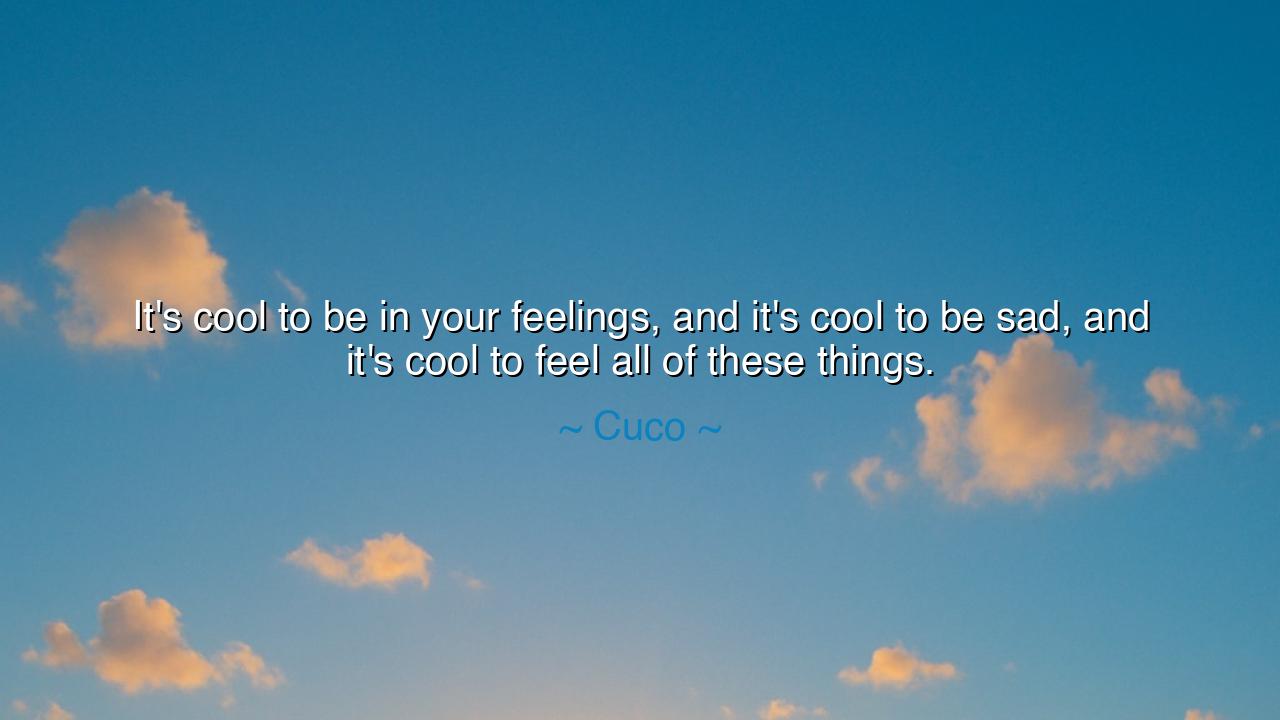
It's cool to be in your feelings, and it's cool to be sad, and
It's cool to be in your feelings, and it's cool to be sad, and it's cool to feel all of these things.






"It's cool to be in your feelings, and it's cool to be sad, and it's cool to feel all of these things." These words from Cuco speak to a timeless truth about the human condition—the importance of embracing our emotions in all their complexity. In a world that often values strength, stoicism, and composure, Cuco's statement challenges the prevailing notion that we must always appear unshaken and invulnerable. Instead, he affirms that it is not only acceptable but empowering to experience the full spectrum of human emotions, including sadness, vulnerability, and confusion. In essence, Cuco invites us to accept our feelings as part of our humanity, urging us to see them as tools of growth and self-discovery, not weaknesses to be hidden.
The ancient philosophers, such as Aristotle, often spoke about the role of emotions in a balanced life. Aristotle believed that emotions, while requiring moderation, were essential for human flourishing. In his writings on ethics, he noted that being able to feel deeply—whether joy or sorrow—was a crucial part of being human. He didn’t advocate for the suppression of emotions but for understanding and control, which allowed one to act wisely and with integrity. Just as Cuco speaks of sadness being a valid feeling to experience, Aristotle saw emotions as integral to the moral life, helping to guide decision-making and connect people on a deep, empathetic level.
In the ancient Greek tragedies, the exploration of human emotion was central. Characters like Oedipus or Antigone were not merely heroes or villains—they were complex individuals whose emotions and responses to fate shaped their journeys. These plays were not simply stories of suffering, but deep investigations into the human soul—its fears, desires, and vulnerabilities. The characters' pain, sorrow, and regret were as significant to their stories as their actions, revealing that emotions are not distractions from our humanity but rather essential aspects of it. Just as Cuco encourages people to sit with their feelings, the ancient Greeks acknowledged that sorrow and joy were two sides of the same coin, both equally capable of teaching us valuable lessons.
Consider the life of Marcus Aurelius, the Roman emperor and Stoic philosopher, who famously kept a personal journal reflecting on his emotional struggles. Despite his position of power, Marcus was deeply aware of his vulnerabilities and human limitations. His Meditations show how he worked through his own feelings of frustration, fear, and sadness, not as a ruler who had to be unyielding, but as a man who was grappling with the complexities of existence. Marcus teaches us that feeling deeply, even in positions of power, is not a failure but a pathway to greater self-awareness and compassion for others. In his words, "The happiness of your life depends upon the quality of your thoughts." By embracing his emotions, Marcus found ways to move beyond them and grow stronger, just as Cuco suggests we can grow through our own feelings.
In our own time, we often see the pressure to maintain a facade of perfection—especially in a world of social media where curated lives are the norm. Yet, as Cuco suggests, embracing sadness and vulnerability is not a sign of weakness but a form of authenticity and strength. There is power in self-acceptance—in being comfortable enough with who we are to acknowledge when we are not okay, and to lean into those feelings instead of pushing them away. This idea echoes the philosophy of Rainer Maria Rilke, the poet, who advised, "Be patient toward all that is unsolved in your heart and try to love the questions themselves." Rilke’s words, like Cuco’s, remind us that it is in the act of embracing our uncertainty and emotion that we can begin to understand and transform our experiences.
The lesson here is one of acceptance—to allow ourselves the space to feel fully and without judgment. Just as Cuco celebrates the validity of sadness and vulnerability, we must honor these emotions in ourselves and others. Feelings are not obstacles to be overcome, but the very means by which we navigate and make sense of our lives. By embracing our emotions, we open ourselves up to growth, healing, and authentic connections with those around us. We must not hide from our sadness or sorrow, for they carry within them the seeds of self-discovery and strength.
In practical terms, this means giving ourselves permission to feel whatever arises within us, and taking the time to reflect on and process those emotions without guilt. It also means creating environments—whether in our personal lives or communities—that encourage open emotional expression without shame. When we allow ourselves to feel and acknowledge the depth of our experiences, we not only honor ourselves but also open the door for others to do the same. The world can be a more empathetic and understanding place when we share in the full range of human emotions, accepting sadness as much as we accept joy.






AAdministratorAdministrator
Welcome, honored guests. Please leave a comment, we will respond soon